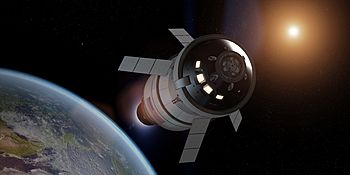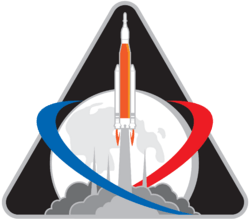Artemis 1 facts for kids

Artist's rendition of Orion spacecraft during a TLI maneuver
|
|
| Mission type | Lunar orbital test flight |
|---|---|
| Operator | NASA |
| Mission duration | Planned: 3 weeks |
| Distance travelled | Planned: 1.3 million mi (2.1 million km) |
| Spacecraft properties | |
| Spacecraft type | Orion MPCV |
| Manufacturer | Lockheed Martin / Airbus |
| Start of mission | |
| Launch date | Planned: June 2020 |
| Rocket | SLS Block 1 |
| Launch site | Kennedy LC-39B |
| End of mission | |
| Landing site | Pacific Ocean |
| Orbital parameters | |
| Reference system | Selenocentric |
| Period | 6 days |
| Moon orbiter | |
| Orbital insertion | Planned: 2020 |

|
|
Artemis 1 is a super important space mission by NASA. It's the very first flight of the powerful Space Launch System (SLS) rocket. It's also the second flight for the Orion Multi-Purpose Crew Vehicle, which is the capsule that will carry astronauts in the future.
This mission is uncrewed, meaning there are no people on board. It's a test flight to make sure everything works perfectly before astronauts fly on later Artemis missions. Artemis 1 will travel around the Moon and then return to Earth.
Contents
What is the Artemis Program?
The Artemis program is NASA's plan to send humans back to the Moon. This time, they want to land the first woman and the first person of color on the lunar surface. The program also aims to set up a long-term human presence on the Moon. This will help prepare for future missions to Mars.
Why is Artemis 1 a Test Flight?
Artemis 1 is a test to check out the new rocket and spacecraft. It will show if the SLS rocket is powerful enough to send Orion to the Moon. It will also test how well the Orion capsule works in deep space. This includes its systems, heat shield, and parachutes for landing back on Earth.
The Spacecraft and Rocket
Artemis 1 uses two main parts: the Space Launch System rocket and the Orion spacecraft.
Space Launch System (SLS) Rocket
The SLS is a giant rocket, taller than the Statue of Liberty. It's the most powerful rocket NASA has ever built. It has two solid rocket boosters and four powerful engines. These engines give it the thrust needed to escape Earth's gravity and send Orion towards the Moon.
Orion Spacecraft
The Orion spacecraft is designed to carry astronauts far beyond Earth. For Artemis 1, it will fly without a crew. It has a crew module where astronauts will sit in future missions. It also has a service module that provides power, water, and oxygen. The service module also helps with propulsion (moving through space).
The Mission Journey
Artemis 1 will follow a specific path to the Moon and back.
Launch and Journey to the Moon
The mission starts with the launch from Kennedy Space Center in Florida. The SLS rocket will blast off, pushing Orion into space. After reaching Earth orbit, the rocket's upper stage will give Orion another big push. This push sends Orion on its way to the Moon.
Orbiting the Moon
Orion will spend several days orbiting the Moon. It will fly closer to the Moon than any human-rated spacecraft has flown before. This part of the mission helps test how Orion handles the deep space environment. It also allows engineers to collect important data.
Return to Earth
After its lunar orbit, Orion will begin its journey back home. It will re-enter Earth's atmosphere at very high speeds. The heat shield on Orion is crucial here. It protects the capsule from the extreme heat caused by friction with the air. Finally, large parachutes will deploy to slow Orion down for a splashdown landing in the Pacific Ocean.
What's Next for Artemis?
Artemis 1 is just the beginning.
- Artemis 2 will be the first crewed flight of Orion. Astronauts will fly around the Moon but won't land.
- Artemis 3 aims to land astronauts on the Moon's south pole. This will be the first human Moon landing since 1972.
These missions are important steps towards exploring space further and possibly sending humans to Mars.
Images for kids
-
AstroRad vest on International Space Station (ISS)
See also
 In Spanish: Artemis 1 para niños
In Spanish: Artemis 1 para niños
 | Victor J. Glover |
 | Yvonne Cagle |
 | Jeanette Epps |
 | Bernard A. Harris Jr. |











